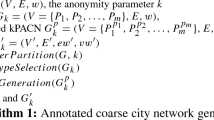Abstract
The offering of location based services requires an in-depth knowledge of the subscriber’s whereabouts. Thus, without the existence of strict safeguards, the deployment of such services may easily breach user privacy. To address this issue, special algorithms are necessary that anonymize user location information prior to its release to the service provider of the telecom operator. In this paper, we extend existing work in historical K-anonymity (1) by considering an underlying network of user movement and (2) by pushing the core functionality of the anonymizer into a spatiotemporal DBMS. The proposed scheme allows each individual to specify his/her anonymity requirements, involving a series of spatiotemporal regions that are considered as unsafe with respect to his/her privacy. When the user requests an LBS from within one of his unsafe regions, the anonymizer performs a spatial along with a temporal generalization of his request in order to protect the user’s privacy. If the generalization algorithm fails to provide the necessary anonymity, the system dynamically constructs a mix-zone around the requester with the aim of unlinking his future requests from the previous ones. As the experimental results indicate, by utilizing the spatiotemporal capabilities of the used DBMS, the performance of the anonymizer improves when compared to existing work in historical K-anonymity.




Similar content being viewed by others
References
Beresford A, Stajano F (2004) Mix zones: user privacy in location-aware services. In: Proceedings of the IEEE workshop on pervasive computing and communication security (PerSec), pp 127–131
Bettini C, Jajodia S, Wang XS (2000), Time granularities in databases. Data mining and temporal reasoning, LNCS series. Springer, Berlin
Bettini C, Wang XS, Jajodia S (2005), Protecting privacy against location-based personal identification. In: Proceedings of the 2nd VLDB workshop on secure data management (SDM), pp 185–199
Brinkhoff T (2002) A framework for generating network-based moving objects. Geoinformatica 6(2):153–180
Gedik B, Liu L (2004) A customizable K-anonymity model for protecting location privacy. Technical report, Computer Science Department, Georgia Institute of Technology, USA
Gruteser M, Grunwald D (2003), Anonymous usage of location-based services through spatial and temporal cloaking. In: Proceedings of the 1st international conference on mobile systems, applications and services (MobiSys), pp 31–42
Gruteser M, Hoh B (2005) On the anonymity of periodic location samples. In: Proceedings of the 2nd international conference on security in pervasive computing, LNCS series. Springer, Berlin, pp 179–192
Kalnis P, Ghinita G, Mouratidis K, Papadias D (2007) Preventing location based identity inference in anonymous spatial queries. IEEE Trans Knowl Data Eng (TKDE) 19(12):1719–1733
Mokbel MF, Chow C-Y, Aref WG (2006) The new casper: query processing for location services without compromising privacy. In: Proceedings of the 32nd international conference on very large data bases (VLDB), pp 763–774
Sweeney L, Samarati P (1998) Protecting privacy when disclosing information: K-anonymity and its enforcement through generalization and suppression. In: Proceedings of the IEEE symposium on research in security and privacy, pp 1–19
Zacharouli P, Gkoulalas-Divanis A, Verykios VS (2007) A K-anonymity model for spatiotemporal data. In: Proceedings of the ICDE workshop on spatiotemporal data mining (STDM), pp 555–564
Acknowledgments
This research has been partially funded by the European Union under the FP6-IST-FET programme, Project No. FP6-14915, GeoPKDD: Geographic Privacy-Aware Knowledge Discovery and Delivery. The authors would like to thank the anonymous reviewers for their thoughtful comments which have further improved the quality of this work.
Author information
Authors and Affiliations
Corresponding author
Rights and permissions
About this article
Cite this article
Gkoulalas-Divanis, A., Verykios, V.S. Concealing the position of individuals in location-based services. Oper Res Int J 11, 201–214 (2011). https://doi.org/10.1007/s12351-009-0050-x
Received:
Revised:
Accepted:
Published:
Issue Date:
DOI: https://doi.org/10.1007/s12351-009-0050-x




